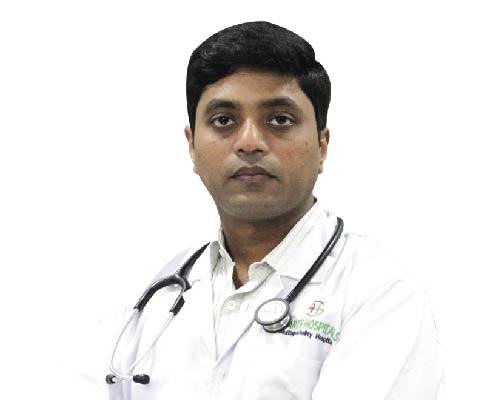Dr. T. Siddarth Reddy
Best Pediatric Neurologist in Hyderabad
We provide innovative cures and treatments for infants, children and adolescents with disorders of brain development, function and behavior.
With our family-centered care approach, we work with you and your family to fully understand your child’s needs and make everyone a positive part of their treatment.
Dr. T. Siddarth Reddy
Gold Medalist - M.D, DM (Neurology), Paediatric Neurology Fellowship, Texas, USA
Dr. T. Siddarth Reddy is a Paediatric & Adult Neurologist in Hyderabad, he completed his Paediatric Neurology fellowship under the guidance of top neurologists from Driscoll Children Hospital, Texas, USA.

Sidarth Neuro Hospital
Comprehensive Pediatric Neurological Care
Neurological disorders in children can be present at birth (congenital), or they can develop as a child grows. While all neurological disorders involve the brain, nerves or spinal column, symptoms can vary greatly depending on the condition.
Signs of a neurological problem may include tremors, seizures, changes in reflexes, severe headaches, muscle rigidity, and delays in developmental milestones. Having your child properly diagnosed and treated can make a major difference in your child’s quality of life today and in the future.
The Sidarth Neuro Hospital for Children Neurology practice, features a multidisciplinary team of pediatric neurology experts offering advanced treatments for a wide range of neurological conditions, including:
- Seizures and Epilepsy
- Childhood Headaches
- Developmental Delay
- Cerebral Palsy
- Congenital Brain Disorders
- Concussion and Head Injuries
- Neuromuscular Disorders
- Hypotonia
- Tics and Movement Disorders
- Neurocutaneous Syndromes
- Demyelinating Diseases
- Neuroimmunological Disorders
- Neurometabolic disorders
- Spasticity
- Spina Bifida
FAQ
Pediatric Neurology FAQs
Pediatric Neurologists treat neurological disorders in infants and children. Pediatric neurology is a subspecialty of pediatrics, and requires additional specialized training and often certification.
Child neurologists often diagnose, treat, and manage the following conditions:
Seizures and epilepsy
Muscle problems which may cause weakness, such as: muscular dystrophy or neuropathy
Headaches, including migraines and concussions
Behavioral disorders, including attention-deficit/hyperactivity disorder (ADHD), tics and Tourette Syndrome, and sleep problems
Autism
Developmental disorders, including cerebral palsy, delayed speech, delayed motor milestones, and coordination issues
Intellectual disability
Congenital malformations, which are problems in how the brain forms or develops
Stroke and traumatic brain injury (TBI)
Genetic conditions that affect the nervous system
Autoimmune problems that impact the brain and spinal cord (such as multiple sclerosis)
Infections or inflammation of the brain (such as meningitis or encephalitis)
Brain tumors
Child neurologists often make a diagnosis by hearing about your child’s symptoms, their medical history, and physical exam, but at times, more tests are necessary to make a diagnosis.
Common tests that child neurologists order include:
EEG (electroencephalogram) is a test that looks for problems with the electrical activity in your brain. This test can be used to look for seizures, and to make sure your child’s brain is making the expected types of electrical activity for their age.
MRI (magnetic resonance imaging) or CT scan are types of imaging tests used to take pictures of the brain and/or spine. These can look for signs of brain tumor, stroke, infection, multiple sclerosis, certain genetic conditions, and more.
Lumbar puncture (spinal tap) is a test where doctors insert a small needle in the lower back to take a sample of spinal fluid, which surrounds your brain and spinal cord. This can help look for signs of infection or inflammation.
Blood tests may be ordered for your child. These may include basic labs checking for electrolyte changes or signs of infection, or more complicated testing such as genetic tests for specific disorders.
During a visit to a pediatric neurologist, your child will be assessed using several different techniques. For example, the doctor may use a reflex hammer on the knees and elbows to test reflexes. Or he or she may use lights to check nervous system function.
In order to assess your child’s balance, motor skills, mental status, and coordination, they may also ask your child to:
- Walk or run
- Stand from a sitting position
- Report words or phrases
- Answer questions
Because the pediatric neurologist works with children, they are specially trained to work with patients whose verbal skills are nonexistent or limited. However, they will often ask the parents or caregivers questions to better assess what is going on with the child.
040-20202000
24/7 EMERGENCY & APPOINTMENT HELPLINE
